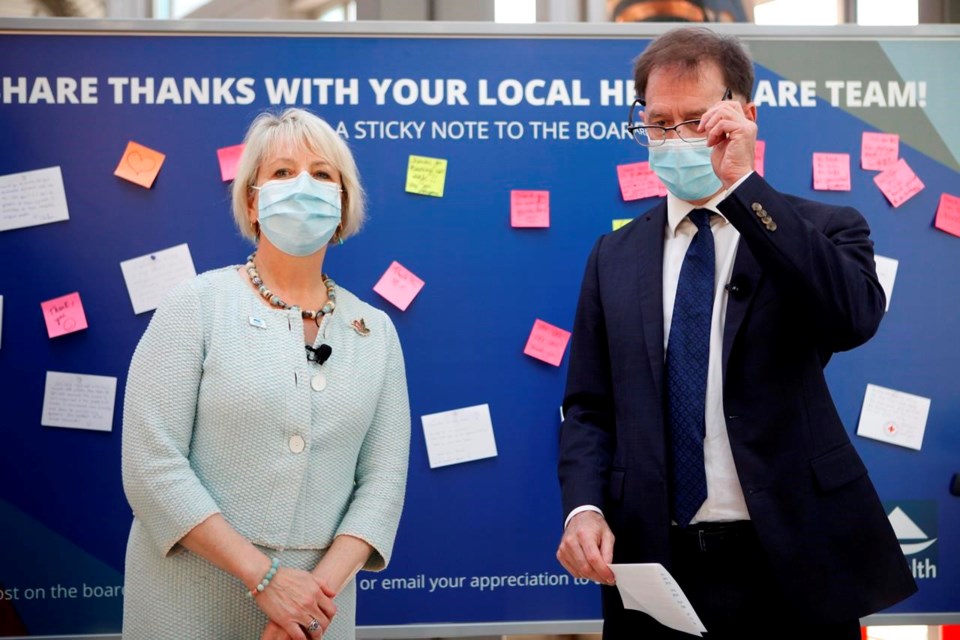VICTORIA — British Columbia's top doctor is encouraging everyone connected with children under 12 to get vaccinated as the school year begins next week as the latest modelling suggests COVID-19 cases are expected to rise by the end of September.
Dr. Bonnie Henry said about 600,000 kids in that age range are not eligible for vaccination in B.C., and recent talks with her counterparts at the Centers for Disease Control and Prevention in the United States indicated a rise in severe cases leading to hospitalizations is directly linked to low immunization rates in the community.
Henry said Tuesday that COVID-19 cases among young children in the province have risen only slightly and very few of them have been hospitalized, but everyone from parents to school staff and bus drivers should be fully vaccinated.
However, she said mandating vaccines for teachers and staff, who were prioritized for immunization, is not currently being considered while the focus is on other measures. They include the rehiring of contact-tracing staff, using regional strategies to control clusters of cases and providing more vaccination opportunities for 12- to 17-year-olds while keeping in mind that a vaccine for children under 12 is expected to be available, possibly in the fall.
"I am comforted that we have very high levels of immunization in school staff," Henry said. "We want it to be 100 per cent and we're going to be going out and making sure that we can get it up there as high as we can."
Breakthrough infections among older people, especially in long-term care facilities, are due to unvaccinated people bringing COVID-19 into those high-risk settings, she said, adding younger, unvaccinated people with more connections are ending up sick with the virus.
Henry presented data showing that a 40-year-old unvaccinated person has a 34 times higher risk of being hospitalized and an eight times higher risk of dying compared with someone of the same age who has been immunized.
Rising cases would put more pressure on hospitals where staff have been treating critically ill patients with other conditions, Henry noted.
"Physicians are tired, nurses are tired. Our health system has been working on this for a long time, and it is stretched."
The rate of transmission in the province has declined to the point that every infected person now infects one other person, but she said it could come down further with more people getting vaccinated and taking measures like wearing masks and physically distancing.
However, more cases and hospitalizations are expected over the next month before the respiratory season begins, she said. An incremental rise in vaccination would help level off those rates based on how well vaccines have worked so far, Henry added.
British Columbia has mandated vaccination for long-term care staff, who must be immunized by Oct. 12, and Henry said the same policy is being considered for health-care workers in acute care settings as the province works with labour unions.
"It's an important measure for all of us in health care across the board, from acute care to long-term care. We know it's most dangerous and most lethal in long-term care and that's why we started with that group of people and we need to ensure that everybody in that setting is immunized."
Health Minister Adrian Dix said 84.3 per cent of eligible B.C. residents 12 and over have had their initial dose of a COVID-19 vaccine and 76.5 per cent have been fully vaccinated.
The province reported 655 new cases of COVID-19 and two more deaths on Tuesday.
For the two-week period between Aug. 16 and 29, those who were not fully vaccinated accounted for over 80 per cent of cases and nearly 89 per cent of hospitalizations.
Henry said booster shots would first be administered to those in long-term care facilities, perhaps in October, and may also be provided to those who are most immunocompromised, including people who have had transplants. However, she said third doses of a vaccine may not be a reality for the general public until the new year based on guidance from the national and provincial advisory committees on vaccination.
— By Camille Bains in Vancouver
This report by The Canadian Press was first published Aug. 31, 2021.
The Canadian Press



